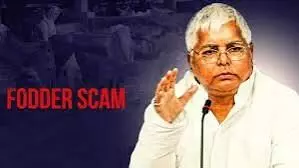Lalu Prasad Yadav's Fodder Scam: A Look Back at the 1997 Arrest.

Patna - On June 17, 1996, the Governor of Bihar granted sanction to the Central Bureau of Investigation (CBI) to prosecute Chief Minister Lalu Prasad Yadav in connection with the Rs 1,000 crore fodder scam.
A year later, on July 25, 1997, Lalu stepped down as Chief Minister, installed his wife Rabri Devi in his place, and floated a new political outfit—the Rashtriya Janata Dal—after splitting from the Janata Dal.
For a year, arguments continued in the Patna High Court, which monitored the CBI investigation under judicial supervision. The central agency eventually filed a chargesheet in the special CBI court, and Special Judge Sudhanshu Kumar Lal issued a non-bailable warrant against Lalu.
Lalu challenged the order in the High Court. After four days of intense arguments, Justice D.L. Dhaliwal rejected his anticipatory bail application on July 24.
That very day, Prime Minister I.K. Gujral's cabinet advised Lalu to resign from his post. The CBI wanted to take Lalu into custody for interrogation.
The agency's young lawyer, Rakesh Kumar, informed the court that the state's Chief Secretary and Director General of Police were not cooperating. Even the local District Magistrate was present at Lalu's residence, and the state administration and police were actively obstructing the agency's efforts.
At the CBI's request, RPF Director General A.P. Duraie was tasked with coordinating assistance. He contacted the Chief Secretary and Bihar's police chief.
On July 30 at 4 a.m., CBI Superintendent V.S.A. Kaumudi went to the Chief Minister's residence but was met with resistance from Lalu's supporters.
Special Prosecutor Rakesh Kumar then sought the permission of a High Court judge to approach Brigadier Nautiyal, the Sub-Area Commander at the Bihar Regimental Centre in Danapur, to request Army assistance for Lalu's arrest.
Nautiyal agreed in principle but said deployment would only be possible after receiving clearance from the Ministry of Defence in Delhi.
Meanwhile, at the CBI office on Boring Road, DIG U.N. Vishwas, who was leading the operation, wrote to express fear that Lalu's supporters might kill him and that he was unable to reach the High Court due to the volatile atmosphere.
Contact was made with CISF DIG Kishore Kunal, stationed in Patna. Vishwas reportedly told him, "Kunal saheb, I'll be murdered today."
Immediately, a CISF unit was dispatched to escort him to the court, with another team deployed for security duty.
When Lalu's appeal reached the Supreme Court, no lawyer appeared on his behalf. Finally, on July 25, he resigned and appointed Rabri Devi as his successor.
Realising that no help would come from the judiciary, the central government, or the Army—which could arrive at his residence at any moment—Lalu quietly slipped out of the back gate of the Chief Minister's bungalow, which opened onto Circular Road, on July 30.
Eyewitnesses recall that both Rabri Devi and Lalu were sobbing inconsolably, tears streaming from their eyes.
Lalu reached the courtroom of Special CBI Judge Sudhanshu Kumar Lal at the Patna Civil Court, accompanied by his lawyers. A long legal argument ensued.
During the lunch break, Judge Lal went to his chamber, and when he returned, he found Lalu seated on a chair. Visibly annoyed, the judge snapped, "You are an accused. Go stand in the dock."
After hearing both sides, Judge Lal rejected Lalu's bail plea and ordered that he be taken into custody. He was sent to the IPS Mess at the Bihar Military Police headquarters in Phulwari Sharif, which had been converted into a temporary jail.
Lalu remained there for 135 days. Senior government officials and ministers continued visiting him throughout his custody.
This was Lalu's first stint in jail while still holding power. When he finally got bail, a grand procession of elephants and horses was organised to celebrate his return.
